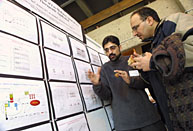Students sharing science
The hallways of Leacock buzzed with conversation February 26, but it was hardly the usual banter about television shows, relationship woes or upcoming essays. Instead, while undergraduates enjoyed their midterm break, students at the third Annual McGill Biomedical Graduate Conference bandied about concepts like polysaccharide self-assembled nanocoating, metabolic phenotyping and zipper transcription factors.
 Ehsan Sharif Askari explains his work to Osama Kishta
Ehsan Sharif Askari explains his work to Osama KishtaPhoto: Owen Egan |
|
That people were talking is a strong measure of the event's success. Caroline Rousseau, a PhD student in experimental medicine and founder of the first biomedical graduate conference, hosted by the Experimental Medicine Gradu-ate Student Society (EMGSS), said she had one goal in mind from the start: "Communication." This year's organizers have remained faithful to that vision.
"You could have the greatest find in the world," said EMGSS co-president Randy Levitt. "But you need to learn how to present your work, explain your work and answer questions properly." Without these skills, he said, scientists would have a hard time convincing the academic community of the importance and validity of their research.
Good communication begets good science, said the conference's keynote speaker, Lawrence Rosenberg, director of the division of surgical research in McGill's Department of Surgery and diabetes researcher. "One of the big problems we have in science in general is: how do we convey what we know?" Most of the knowledge scientists have, he said, stays in their heads; published research conveys only a fraction of this learning. Because of this, conferences are essential opportunities for scientists to mine each other's minds for information and to forge the social-political connections that will bolster their research careers.
The EMGSS tried to promote such interactions with their conference. They brought together over 100 students from the 10 biomedical graduate departments to give presentations in one of nine categories. The student with the best submission in each category was asked to give an oral presentation. This year's winner of the oral presentations was Julie Pilotte, a neurobiology student studying the cellular-level defects of quaking viable mice.
Participants were encouraged to chat. They had plenty of opportunity to do so, whether discussing at a presenter's poster the finer details of purification techniques or talking over drinks at the reception about the implications of regenerating insulin-producing cells. It is not often that students can do this. Laboratory work is rather insular, said Levitt, and students from different departments rarely have the chance to intermingle. A genetics researcher and a developmental biologist might be working on a similar project, but it is unlikely the two would cross paths.
This is particularly true in the faculty of medicine, said immunology professor Roger Palfree, a devoted attendee of the conference. "We're not a regular department. We have labs scattered all over the place." Students work everywhere from the Royal Victoria to the Lady Davis Institute at the Jewish General Hospital.
Because students came from diverse scientific backgrounds and since their projects were quite technical and highly specialized, some participants felt that the conference did not help develop their science much. Nicolas Bousette was one. He said he had explained his project several times to people, but had not received much feedback. "It's pretty much one way."
However, the students the Reporter questioned said they valued the practice of presenting their studies. It's a great opportunity to do this before going to an international conference, said Ryan Ward, a new graduate student whose supervisor highly encouraged him to participate.
It is an opportunity few take. Levitt and EMGSS co-president Sabrina Perri both expressed frustration that more students did not participate. Perri would like to see at least twice as many biomedical graduate students submit abstracts to the conference.
The EMGSS has slowly been broadening the type of students that can participate. This year, they added a new judging category, "Research Project Proposals," to let new graduate students present. Levitt is hoping to open the doors to post-docs and technicians next year.
The conference began as a way to open doors. The founder, Caroline Rousseau, said she felt frustrated by the non-existence of biomedical graduate-level forums. Although the experimental medicine department hosted a yearly poster presentation of student research projects, according to Rousseau few students enjoyed participating and there was no opportunity to meet graduate researchers in other departments and find out what they were doing. She approached the director of experimental medicine, Gerald Price, with the idea of organizing a student-run interdepartmental conference. He was skeptical. However, Rousseau and the EMGSS drafted a business plan and, after a year of work, the first conference took place in 2001 with two financial sponsors and 70 presenters. The conference has since grown. This year it attracted 16 sponsors, 102 presenters, and approximately 75 onlookers.
The current EMGSS co-presidents have ambitious plans for the future. Université de Montréal and Concordia hold their own conferences but, in the spirit of promoting dialogue, Perri said she would like to integrate these into the McGill event. She imagines an eventual provincial or even national inter-university conference, but not for a while yet.
Events like this take great efforts to organize. "It's almost like a full time job," said Levitt. Even expanding the conference to encompass Montreal would present problems. What language would it be in? Would all presentations have to be bilingual? Who would host it? Who would judge it?
"I think we have to make sure that we can attract as many students as possible [from our own university] before expanding," said Perri.
In order to do so, Levitt said that he would like other department societies to join the EMGSS in organizing the conference.
For the time being, though, Levitt and Perri are revelling in the knowledge of a job well done. "We couldn't have expected a better turnout," said Levitt. "We got a lot of positive comments, and now we're looking forward to next year."

